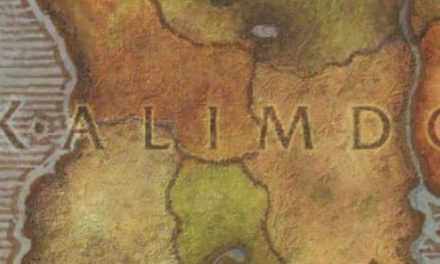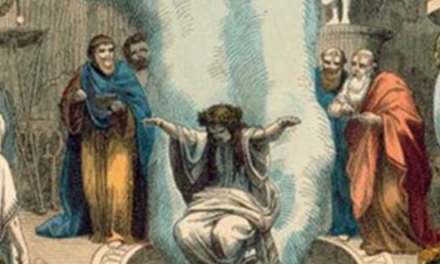With the banquet guests’ screams giving way to silent shock, a hush fell upon the hall. The most important and noteworthy men and women of Rokugan could hardly process what unthinkable horror had struck in their very presence – someone raising a blade against the Son of Heaven, working with co-conspirators in an attempt to slay the Emperor himself. In over one-thousand years of Hantei rule, not a single one had his life threatened, much less taken, by an assassin’s blade. He was the very embodiment of the wisdom of the gods, ruling and governing the Empire, as had his fathers before him, protecting the land and its peoples against threats both from without and within.
Five samurai lay prostrate in supplication, their faces pressed firmly to the polished wooden floor, as if attempting to will the ground to sink, that they may present themselves even lower, more humbly, before the great Hantei. Their victim lay motionless nearby, blood oozing from a dozen wounds, any one of which would have proved fatal to a normal man. The five had wielded weapons of steel and magic in the presence of the Emperor – a capital crime – even if it had been to save his life from the would-be assassin, the man they once called friend, twisted and fueled by terrible rituals and unspeakable crimes.
With their leader fallen, other, less capable, assassins were soundly routed by the Emperor’s personal guard. The first banquet of Winter Court had become a public abattoir, friend and foe of the Empire alike having fallen in the unexpected melee. Unexpected, save by the five samurai who had spent years derailing the vile plans of the assassin at every turn, forcing him to make this most public, and drastic, move. Each one of them, entering the banquet hall among the other, more jovial, guests, knew at their core that they would not survive the night – either they would die defending the Emperor or they would be rightly punished for bringing violence to his court. In either case, they had made peace with their decision. They were the only samurai capable of stopping the terrible plot, and honorable samurai serve their lords, even beyond death itself.
Five samurai, unique backgrounds leading to very distinct interpretations of the ceach ode of Bushido, were prepared to hear their sentence. One hoped the act of saving the Emperor would finally impress his ancestors. Another that his actions would keep his wife safe. One shugenja prayed that the assassin’s foul blade would be secured, never again to poison the minds of men, the other that she, eventually, would be regarded as a heroine in the halls of legend. The last warrior finally saw the whole of her lifelong training come to fruition, with a blinding epiphany – no matter the honor and sanctity, the awe and reverence, a samurai held for their blade, it was no less a tool than the farmer’s scythe or the historian’s brush. The samurai, not their blades, were both the attacker and the defender. The samurai was singly a device of great good or great evil, and it was only through a harmony of the elements that enlightenment could be reached, through purity of purpose and conduct.
“Out,” the Emperor whispered, his aging voice hoarse and raspy. “Out!” he barked more harshly, turning to his guards. Broken from their stunned reverie, guests began scrambling for the exits, encouraged by the imperial troops. Over a hundred guests flooded from the room, in many cases the most important representatives of their respective Clans. The five samurai did not move – the order was not for them.
When the doors finally closed and the sound of rustling dinner kimonos had faded, the large hall felt impossibly large, and yet still filled with the oppressive gravity of what had just transpired. The Emperor, his son, several guards, and two high-ranking Scorpion Clan members were all who remained, aside from a large compliment of guards, hands at the ready to draw steel at their lord’s command, and the five samurai, with hands and faces still pressed to the floor in apology and obedience.
“Explain yourselves,” the thirty-eighth Hantei demanded to the emptied room, his dark eyes looking over each of the samurai before turning to the corpse fallen at his side.
Four of the samurai knew better than to respond. They were each magistrates serving an imperial office, but even in their camaraderie there was a first among equals. Isawa Tamaseiko, a shugenja of no small renown, who’s jade-infused magics had burned the flesh of the traitorous monster, almost imperceptibly lifted her head from the floor. “Great Hantei,” she began, her voice eventually finding purchase. One did not lightly speak in the presence of the Son of Heaven, let alone to him directly. “We five are magistrates who became aware of a terrible plot that culminated in the plot against yourself this very evening.” She paused, swallowing hard, that the Emperor may interject, should he choose. He did not.
“The man known to this court as Kakita Kendai has been the architect of tragedies and crimes across your Empire for at least three full years,” she continued. “Including instigating the Crane-Crab war of recent memory, in allegiance with the Kolat separatist faction.” The war had cost countless samurai and conscripted ashigaru their lives, as well as diverted essential resources away from investigations into dark events that were spreading across the land. A diversion, the magistrates knew, very nearly worked.
Hearing nothing from the Emperor, Tamaseiko explained further. “We five, under the instruction of the magistrates Daidoji Shunmichi and Shosuro Tokata, have worked to stop both the Kolat and the foul sorcerers that threatened your great Empire, traveling from the northern reaches of the Phoenix mountains and down to Earthquake Bay, attempting to put right what these monsters had designed to enact.”
The Emperor tapped a single finger against the table, a soft sound that nevertheless filled the hall and quieted the Phoenix shugenja. “Daidoji Shunmichi fell in the line of duty, protecting some of this court’s most important members. Shoju, do you know of this ‘Tokata?'” he inquired of the Scorpion Clan Daimyo, a man it was said possessed secret information on almost every samurai in Rokugan.
“I do, my lord,” the masked and red-robed man replied, bowing deeply. “He is well-known to your Emerald Magistrate and has been tasked with the research of many underhanded events that have occurred of late across the Empire.” Cold eyes turned to the Phoenix. “Just as this samurai claims.”
The captain of the Imperial guard, breathing heavily from his own wounds taken during the skirmish, nodded in agreement. “These five brought their concerns to my personal attention, and have kept me abreast of their investigation while within the Imperial City. Her words match their actions.” Grimacing with the effort of even a slight bow, he exited the room to tend to his wounds at a gesture from the Son of Heaven.
The Emperor considered the Phoenix and Scorpion’s words, along with those of his personal guard, heartbeats echoing like unrelenting drums in the prone samurai’s ears. “Stand,” he said, gesturing to his guard to give them room.
The desire to immediately follow the Emperor’s command was in each of them tempered by the shadow of fear of what he would order next. Even the most honorable and stalwart among them felt its cold hand on his heart as he rose, slowly, keeping his head bowed out of deep respect. The five samurai had been in the Emperor’s presence once before, where it was decreed that, the following Spring, each of them would be attending the Emerald Magistrate’s own academy, in honor of their service to the ideals of peace and good order in society. None of the samurai expected him to remember the meeting, for surely he had many such throughout the his day, but each of them could hardly contain a gasp as he addressed them by name
“Isawa Takaseiko. Iuchi Minoriko. Akodo Teiji. Murimoto Inazuma. Doji Satoru.” His voice was unreadable. Each of the samurai felt at once unimagined pride and innate shame at being recognized by the Emperor himself. Though they had spent their careers serving the Empire, witnessing and overcoming more hardship than any samurai could be reasonably expected to, almost to a one they felt they were all of them unworthy to be addressed so.
“You will retire,” he began, old voice at odds with his fierce eyes. “You will retire from this place and your needs will be seen to. Shortly we will reconvene that I may hear the whole of your story.” He glanced about the room, with the spilled food, pools of blood, and corpses from the battle. “We shall meet again in a more comfortable setting.”
The Emperor rose, his son helping him to his feet. “And Minoriko,” he added, starting to leave the room, “make sure that terrible blade is secured safely,” he cautioned, referencing the cruel katana which filled its wielder with terrible ambition – the kind that had caused Kendai to attempt the life of his Emperor.
The shugenja’s cheeks burned – of course she would keep such a thing safe, such that it could never be used. Even as the thought passed through her mind however, the seductive tendrils of its power flitted across her imagination. Perhaps only she was worthy enough to protect such an artifact. She, and she alone.
With the Emperor and his advisors gone, the samurai were left surrounded by the imperial guard. The Emperor had said they would meet again, but that shadow of fear remained – would these loyal soldiers strike them down for their crimes, dispensing the Empire’s justice on orders the samurai missed?
“This way,” one of the guard said, gesturing to the hallway from which the Emperor’s most distinguished guests had entered the hall. “Baths and changes of clothing are waiting.”
Outside the bloody banquet hall, in the expertly-tended gardens which dotted the Emperor’s personal home, soft snows began to drift lazily from the sky. From a nearby cherry blossom tree, a petal softly falls.
Last week I ran the last session of my long-running Legend of the Five Rings role-playing campaign. With nearly 600 hours of play time, let alone the endless evenings and mornings spent preparing and designing the adventures, the past 70 months have been truly spectacular, and I sincerely hope the far-reaching story arc was a fantastic introduction to the world of Rokugan for my new players, and a welcome return for those who had played the game before.
There’s so much to say about a campaign that lasted six full years, a complete chronicle that started with our heroes as small-time investigators and ended them jumping into battle to save the Emperor himself, and I’ve tried to write a post describing it all no less than four different times this weekend. Each character was richly-detailed and fully-developed by my amazing players, with real growth and progression as they experienced and directed the story.
I tend to run long chronicles, my last Dungeons and Dragons campaign lasting just over four years, but very rarely do I have as clear an idea of where I hope the story goes as I did from the outset of this game. From moment one, reading the characters’ backstories, I knew who the ultimate evil force would be, how they would work to achieve their aims, and what friends and foes the party would likely meet along the way. I couldn’t make more than broad plans however, because the methods in which the characters solved the various problems and situations presented to them wildly changed the overall plot, including causing the enemy to scramble to make and enact contingency plans on more than one occasion.
After so many weeks and years of exploring the world of Rokugan, and helping others to do the same, it feels very odd to realize that I don’t have more story to help them tell. The overall plot may have been my design, but ultimately it was the players, through their characters, who brought the story to life. After our last session, which ended with the big bad dead on the floor next to the Emperor, the party wanted closure to the story and I wanted to give them an ending that was both satisfactory and open to their own individual interpretations.
The above is my attempt to wrap a bow on the end of the chronicle, and I hope it provides interest even to those who weren’t involved in the story as was told over Sunday afternoon gaming sessions.
Thank you for your time and interest, and a very sincere thank you to my players for their zeal and commitment to a world I had sincere joy in bringing to life for them.
















